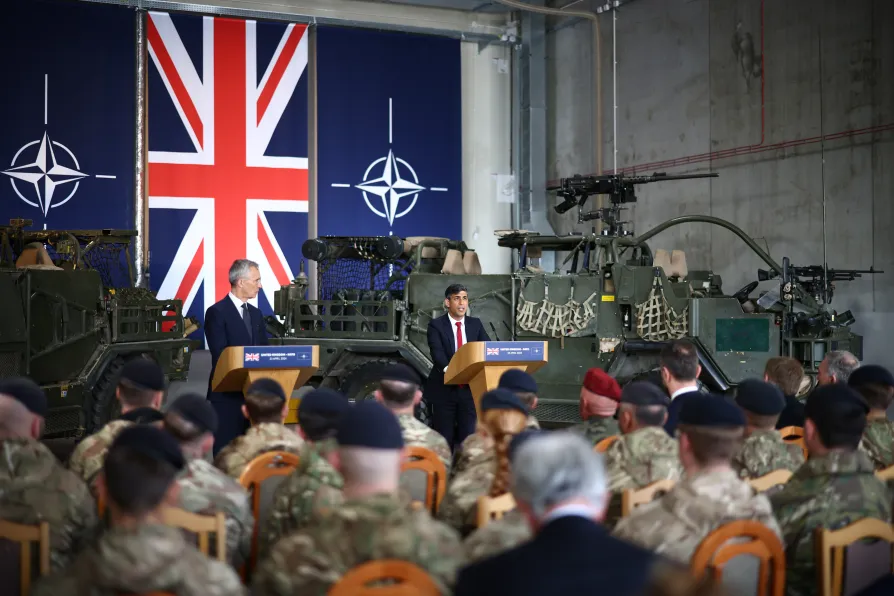
 NATO Secretary General Jens Stoltenberg (left) and Prime Minister Rishi Sunak during a press conference at the Warsaw Armoured Brigade in Warsaw during Rishi Sunak's visit to Poland and Germany, April 23, 2024
NATO Secretary General Jens Stoltenberg (left) and Prime Minister Rishi Sunak during a press conference at the Warsaw Armoured Brigade in Warsaw during Rishi Sunak's visit to Poland and Germany, April 23, 2024
AS Britain plods through a parochial no-change general election campaign it is sobering to consider that this might be the last time voters are consulted before either the world economy plunges deeper into crisis, or great power war breaks out, or both.
Both Rishi Sunak and Keir Starmer claim to be committed to putting “national security” first, yet neither offer the slightest deviation from the prevailing made-in-Washington march to calamity.
The agenda is clear. Tariffs and subsidy wars rupture links in the world economy as the US struggles to maintain its floundering hegemony. An escalation of militarism provokes new conflicts as the US escalates proxy war against Russia and seeks to block China’s advance.
And that is before we consider the crisis in the Middle East, with the possibility of direct Anglo-American military confrontation with Iran arising out of their consistent support for Israel’s far-right government and its genocidal assault on Gaza.
The Economist, the invariant champion of liberal imperialism and the free-market order, sees doom on the horizon. It wrote last week: “For years the order that has governed the global economy since the second world war has been eroded. Today it is close to collapse. A worrying number of triggers could set off a descent into anarchy, where might is right and war is once again the resort of great powers.
“The disintegration of the old order is visible everywhere. Sanctions are used four times as much as they were during the 1990s; America has recently imposed ‘secondary’ penalties on entities that support Russia’s armies.
“A subsidy war is under way, as countries seek to copy China’s and America’s vast state backing for green manufacturing. Although the dollar remains dominant and emerging economies are more resilient, global capital flows are starting to fragment.”
The instruments of international order, from the United Nations to the World Trade Organisation to the International Criminal Court are either paralysed or under right-wing attack, the publication adds.
Some might welcome measures to protect domestic industries. But have no illusions that imperialism is imposing controls in order to protect workers’ jobs. It is doing so to strengthen domestic monopoly capitalism and imperialist world power.
US President Joe Biden made this clear when he recently announced measures directed against Chinese industry.
“I just imposed a series of tariffs on goods made in China: 25 per cent on steel and aluminium, 50 per cent on semiconductors, 100 per cent on EVs [electric vehicles], and 50 per cent on solar panels. China is determined to dominate these industries. I’m determined to ensure America leads the world in them,” he tweeted.
This poses the issue starkly as US versus China. History shows that such rhetoric accompanying such measures is seldom the end of the matter. It is the harbinger of armed conflict.
Yet these issues scarcely get a mention in the electoral debate, beyond banal references to challenging President Vladimir Putin.
Britain is fully aligned with US policy in this confrontational posture. Despite public austerity, all but certain to be renewed whoever wins on July 4, the government finds the resources to send aircraft carriers off to the Pacific for no purpose other than challenging China.
And the two main parties compete in pledging to raise military spending to 2.5 per cent of GDP, and that only as a way station to still higher figures.
The anniversary of D-Day serves as a reminder of where this leads. The next government will have to determine whether to follow the US on the path of imperialist war. Given the character of that government, we can be certain that the right choice will only be made if the masses mobilise to make their voice heard.

In a speech to the 12th Xiangshan Forum in Beijing, SEVIM DAGDELEN warns of a growing historical revisionism to whitewash Germany and Japan’s role in WWII as part of a return to a cold war strategy from the West — but multipolarity will win out

The US’s bid for regime change in the Islamic Republic has become more urgent as it seeks to encircle and contain a resurgent China, writes CARLOS MARTINEZ












